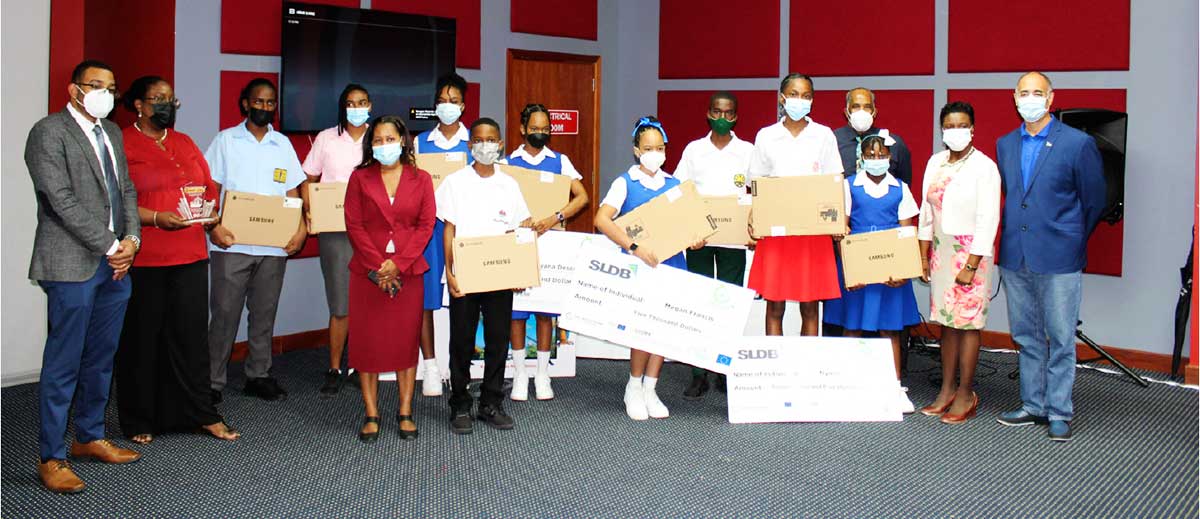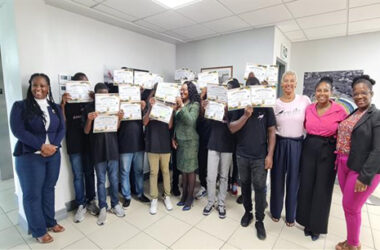The St. Joseph’s Convent (SJC) has secured the first prize in the Low and High Vulnerability Award categories of the Saint Lucia Development Bank’s (SLDB) Act2Adapt Secondary School Challenge, while the Castries Comprehensive Secondary School (CCSS) copped the first place in the Medium Vulnerability category. Out of the twelve participating secondary schools, the Vieux Fort Comprehensive School (VFCSS), Leon Hess Comprehensive School (LHCSS), Saint Mary’s College (SMC) and the SJC made off with the 2nd and 3rd places across the three categories.

Launched in April 2021 under SLDB’s Climate Adaptation Financing Facility (CAFF), the Challenge issued a call to secondary school students to conduct an assessment of their household vulnerability to climate change impacts using the Bank’s innovative Act to Adapt App. Students were further challenged to develop an Adaptation Plan, identifying home improvement projects to reduce vulnerabilities. Based on their determined level of vulnerability in the event of a Category 5 hurricane, students’ entries were assigned to the high, medium and low vulnerability competition categories. The Challenge was intended to generate practical awareness of climate change impacts and what is required to build more resilient homes and communities and to raise awareness of the CAFF, a pioneering mechanism to ensure access to affordable financing to empower homeowners, farmers and other business owners to invest in measures to make their homes, farms and businesses resilient to climate change impacts.
The three first place winners are SJC Form 1 student Maegan Francis (Low Vulnerability Category), CCSS form 4 student Nyann Joseph (Medium Vulnerability) and SJC form 3 student Aiyana Descartes (High Vulnerability). As their reward, the students and their families have secured a CAFF-funded home adaptation project to address some of the vulnerabilities highlighted in their submissions, at the value of XCD $5,000 (Low Vulnerability), $7,500 (Medium Vulnerability) and $10,000 (High Vulnerability). The first place winners also earned prizes for themselves and for their schools.
Under the Low Vulnerability category, second former Dante Eugene of the SMC and VFCSS third former Khye Armstrong won the 2nd and 3rd places respectively. Under Medium Vulnerability, fifth form students Deshawn Jn Baptiste of LHCSS and Bernella Francois of VFCSS won the 2nd and 3rd places respectively. The SJC fielded all three finalists in the High Vulnerability category with second former Athalie Inglis commanding 2nd place and Ethne Browne, also a second former, placing 3rd.
The Challenge resulted in over 120 students registering and working in the Act to Adapt App and attracted thirty-six entries from twelve schools which also included Babonneau Secondary, Beanfield Comprehensive, Choiseul Secondary, Entrepot Secondary School, Sir Ira Simmons Secondary, Soufriere Comprehensive and the Vide Bouteille Secondary.
The winners were announced in a live streamed ceremony on Monday January 24th. In addition to winning students, parents and school representatives, the event was attended by representatives of partners, including the Disaster Vulnerability Reduction Project, represented by the Permanent Secretary of the Department of Economic Development, Mr. Claudius Emmanuel, and Project Coordinator, Project Coordination Unit, Ms. Cheryl Mathurin, the Saint Lucia Institute of Architects, the Association of Professional Engineers of Saint Lucia, as well as representatives of the World Bank, Climate Investment Funds, the European Union and the Organisation of Eastern Caribbean States (OECS) Commission.
In his opening remarks, Deputy Chairman of the SLDB, Mr. Daryl Raymond, stressed the urgency of climate adaptation noting that “it is work that must endure and be continued by future generations.” According to Mr. Raymond, the success of the CAFF cannot be measured “solely by the number and size of loans issued today, but also by our efforts to raise the awareness and consciousness of our young people”. Mr. Raymond added that the success of SLDB’s implementation of the CAFF can also be evaluated by the investments made under the Facility in “ensuring our youth are fully appreciative of climate change impacts, the required adaptation measures and the importance of investments in resiliency solutions. Indeed, the legacy of the CAFF will be long and rich if we continue to engage our youth. The power of our young people is evident not only in their ability to shape the future but also in the immediate influence they exercise in their homes and in their communities”.
Speaking on behalf of the World Bank, Senior Disaster Risk Management Specialist and Task Team Leader, Disaster Vulnerability Reduction Project Mr. Elad Shenfield noted that development in vulnerable regions like the Eastern Caribbean cannot take place without resilience. “One of the core pillars of climate resilience is the ability – as governments, development partners, policymakers, and citizens – to adapt and reduce our vulnerability to climate change and disaster impacts. This competition shows that we all play a role in adaptation”, Mr. Shenfield said, noting that the effort to fight the climate crisis is a collective one. “I’m inspired by the hard work of the students and their engagement. We have winners of this competition, but the actual achievement is in students’ participation, their thinking about climate resilient solutions and implementing them. It is in the understanding, the awareness that we all have a role to play”, Mr. Shenfield concluded.
The recording of the Act to Adapt Competition Award Ceremony is available on the SLDB website, Act to Adapt page.
The CAFF is one component of the Disaster Vulnerability Reduction Project funded through the World Bank, Climate Investment Funds (CIF) and the European Union (EU) – European Development Fund. The DVRP, World Bank, CIF, EU and OECS Commission are partners in the Competition and technical assistance for development of the assessment tool has also been provided through the European Union under the framework of the Africa Caribbean Pacific – EU Natural Disaster Risk Reduction Program.





